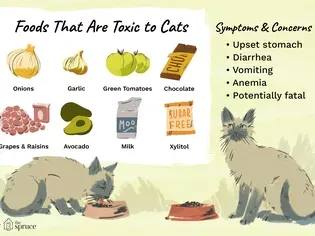Human Foods That Are Poisonous to Cats
Updated on 04/26/24

Protect Your Feline Friend: Human Foods That Are Poisonous to Cats
Cats are curious creatures, often enticed by the tantalizing aromas emanating from our kitchens. However, as responsible pet owners, it's crucial to be aware of the dangers lurking within our seemingly harmless pantry staples. Certain human foods can pose significant health risks to our feline companions, even proving fatal in some cases.
This comprehensive guide will delve into the toxic world of human foods that are poisonous to cats, empowering you to safeguard your beloved pet.
1. Onions, Garlic, and Chives: The Silent Killers
These members of the Allium family, commonly used to add flavor to our dishes, contain thiosulfate, a compound that can cause severe anemia in cats. Ingestion of even small amounts can damage red blood cells, leading to Heinz body anemia, a life-threatening condition.
Symptoms of onion poisoning include:
* Lethargy
* Weakness
* Pale gums
* Difficulty breathing
* Brown or bloody urine
2. Grapes and Raisins: The Mysterious Toxin
Grapes and raisins, seemingly innocuous snacks, can be highly toxic to cats. The exact toxic agent is still unknown, but ingestion can lead to kidney failure, a potentially fatal condition.
Symptoms of grape and raisin poisoning include:
* Vomiting
* Diarrhea
* Loss of appetite
* Lethargy
* Tremors
* Seizures
3. Chocolate: The Sweet Temptation with a Bitter Consequence
Cats lack the enzyme necessary to metabolize theobromine, a compound found in chocolate. Ingestion can cause a range of symptoms, including:
* Vomiting
* Diarrhea
* Increased thirst
* Increased heart rate
* Seizures
* Coma
The severity of symptoms depends on the amount of chocolate ingested and the type of chocolate consumed. Dark chocolate contains higher levels of theobromine and is, therefore, more dangerous.
4. Macadamia Nuts: The Nutty Toxin
Macadamia nuts, often used in desserts and trail mixes, are highly toxic to cats. The toxic agent is unknown, but even a few nuts can cause symptoms such as:
* Vomiting
* Weakness
* Trembling
* Hyperthermia
* Joint pain
5. Xylitol: The Sugar Substitute with a Deadly Twist
Xylitol, an artificial sweetener found in sugar-free gum, candy, and baked goods, is highly poisonous to cats. Ingestion can trigger a rapid release of insulin, leading to hypoglycemia, a life-threatening drop in blood sugar levels.
Symptoms of xylitol poisoning include:
* Vomiting
* Lethargy
* Seizures
* Coma
6. Yeast Dough: The Rising Danger
Yeast dough, before it has risen and been baked, contains ethanol, a type of alcohol that can be toxic to cats. Ingestion can cause:
* Vomiting
* Diarrhea
* Bloating
* Lethargy
* Tremors
7. Raw Meat and Fish: The Parasite Haven
Raw meat and fish can harbor parasites, such as Salmonella and E. coli, that can cause severe gastrointestinal distress in cats. Additionally, raw fish contains an enzyme that can break down vitamin B1, leading to thiamine deficiency.
Symptoms of parasite or thiamine deficiency include:
* Vomiting
* Diarrhea
* Loss of appetite
* Weakness
* Seizures
8. Dairy Products: The Lactose Dilemma
Most cats are lactose intolerant, meaning they lack the enzyme necessary to digest lactose, the sugar found in milk and other dairy products. Ingestion can cause:
* Vomiting
* Diarrhea
* Gas
* Abdominal pain
9. Alcohol: The Intoxicating Threat
Alcohol is highly toxic to cats, causing symptoms ranging from depression and disorientation to seizures and coma. Even small amounts can be fatal.
Symptoms of alcohol poisoning include:
* Vomiting
* Diarrhea
* Lethargy
* Difficulty breathing
* Coma
10. Caffeine: The Stimulating Poison
Caffeine, found in coffee, tea, and energy drinks, can cause agitation, tremors, and seizures in cats. Ingestion of large amounts can be fatal.
Symptoms of caffeine poisoning include:
* Vomiting
* Diarrhea
* Hyperactivity
* Tremors
* Seizures
Protect Your Cat: Prevention is Key
The best way to protect your cat from poisoning is to prevent it from accessing toxic foods. Follow these tips:
* Store dangerous foods securely out of reach.
* Keep your trash cans covered.
* Monitor your cat when it's outside, as it may encounter toxic plants or substances.
* Read pet food labels carefully to avoid products containing toxic ingredients.
Conclusion
Understanding the dangers of human foods that are poisonous to cats is crucial for ensuring their safety and well-being. By being aware of these toxic substances and taking proactive steps to prevent ingestion, you can enjoy a long and healthy life with your feline friend.
Remember, if you suspect your cat has ingested a toxic substance, seek veterinary attention immediately. Prompt medical intervention can significantly increase the chances of a full recovery.
Explore More Pets

Cat Behavior Problems
How to Stop Aggression in Kittens

Long-Haired Cat Breeds
Siberian Cat: Breed Profile, Characteristics, & Care

Cat Behavior Problems
How to Stop Kittens From Scratching and Biting

Long-Haired Cat Breeds
Turkish Angora: Cat Breed Profile, Characteristics & Care

Basic Training
How to Socialize Your Kitten

Short-Haired Cat Breeds
Cute Pictures & Facts About Calico Cats & Kittens

Litter Box Training
Training Your Kitten to Use the Litter Box

Long-Haired Cat Breeds
10 Fun Facts About White Cats